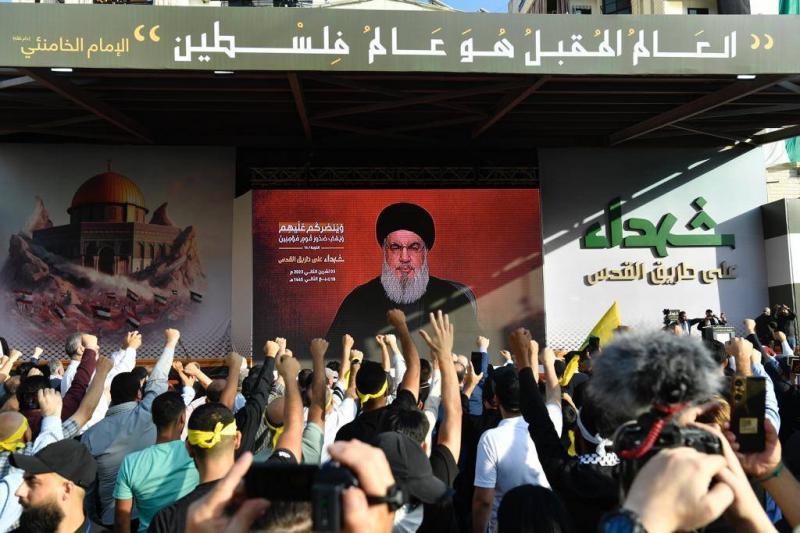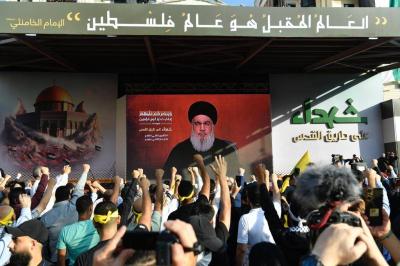The Secretary-General of "Hezbollah," Sayyed Hassan Nasrallah, stated that "the Islamic Resistance in Lebanon has been engaged in a real battle since October 8, which only those present in the border area can truly feel," noting that it is "a different battle in its circumstances, goals, actions, and targets." During a ceremony held by the party in commemoration of the martyrs who fell on the road to Jerusalem, he emphasized that "the Lebanese front has diverted a significant part of the forces that were to be deployed for attacks on Gaza toward us." He said, "What is happening on our Lebanese front at the border is very important and impactful, and it is not sufficient in any case; it is unprecedented in the history of the entity."
He pointed out that "if our stance were purely political solidarity and protests, the Israelis would feel comfortable at the northern border, and their forces would head to Gaza." He reported that "the Lebanon front has managed to draw a third of the Israeli army to the southern border," adding that "a significant part of the Zionist forces that went to the northern front are elite units, and half of the Israeli naval capabilities are in the Mediterranean Sea opposite us and Haifa." He noted that "a quarter of the air forces are directed toward Lebanon and nearly half of the missile defense is aimed at the Lebanese front, alongside the displacement of tens of thousands of settlers."
He affirmed that "these operations on the border have created a state of anxiety, tension, and panic among the enemy's leadership as well as among the Americans." He expressed that "the enemy is worried about the possibility of this front escalating further or sliding into a wide war, which is a realistic possibility that could happen, and the enemy must prepare for it. Our presence on the front and this daily work keeps the enemy deterred. The resistance's operations in the south warn any enemy thinking of attacking Lebanon or launching a preemptive strike that you will commit the greatest folly in your historical existence."
He stressed that "these scenes in Gaza will make us more determined and convinced of the need to challenge and not surrender regardless of the challenges and sacrifices. The enemy today bears the weight of all resistance operations and controls its rhythm because it has a real fear of things going in a direction it fears." He reiterated that "these operations on the border express our solidarity with Gaza to alleviate pressure on them."
He added, "We started work on this front in the south, and its escalation and development are subject to two main factors: the course and evolution of events in Gaza and the behavior of the enemy toward Lebanon." He warned Israel "against the excesses that have affected some civilians in Lebanon, which could bring us back to a civilian versus civilian scenario." He stated: "I say candidly that all possibilities on our Lebanese front are open, and all options are on the table that we could pursue at any time, and we must all be ready for all forthcoming scenarios."
Nasrallah discussed the operation "Flood of Al-Aqsa," confirming that "its decision and execution were entirely Palestinian, and its owners kept it secret from everyone, even from the resistance factions in Gaza." He explained that "this battle is fully Palestinian for the sake of the Palestinian people and their causes, and it has no connection to any regional or international file." He noted that "the absolute secrecy of the operation ensured its great success through the element of surprise." He stated, "This concealment did not bother anyone in the resistance factions at all; rather, we all praised it, and it does not negatively affect any decision made by a team or movement in the resistance axis. This performance by the brothers in Hamas established the true identity of the battle and its goals and thwarted the enemies from distorting the narrative, especially when they speak about the relationships between the regional resistance factions."
He highlighted that "what happened in the Flood of Al-Aqsa confirms that Iran does not exercise any guardianship whatsoever over the resistance factions, and the true decision-makers are the leaders of the resistance and its fighters." He mentioned, "The great and significant work in the Flood of Al-Aqsa led to an earthquake at the level of the Zionist entity — security, political, psychological, and moral — and had existential and strategic ramifications that will leave their mark on the present and future of this entity."
He added, "These results have established a new historical phase for the fate of the countries in the region, and there was no other option; thus, the choice was correct, wise, necessary, and timely and deserves all these sacrifices." He affirmed that "what is happening in Gaza reflects the violent and savage nature of the occupying entity planted in our region," stating that "what is happening in Gaza reveals the direct American responsibility for all this killing and American hypocrisy," announcing that "the Americans are the ones managing the war in Gaza, which is why the decision for Islamic resistance in Iraq was to attack American bases in Iraq and Syria, a wise and brave decision."
Nasrallah declared that "America is fully responsible for the ongoing war in Gaza, and Israel is a tool. America is the one preventing a halt to the aggression on Gaza and rejecting any resolution for a ceasefire." He pointed out that "after the Flood of Al-Aqsa operation, nothing will be as it was before, which requires everyone to bear responsibility." He said, "There are two goals we must work towards: stopping the aggression on Gaza and ensuring that Hamas triumphs in Gaza. The victory in Gaza means the victory of the Palestinian people, the victory of the prisoners in Palestine, and all of Palestine, including Jerusalem and the Church of the Holy Sepulchre, and the peoples of the region."
He remarked that "the enemy is sinking in the sands of Gaza while threatening the Lebanese people with the blood of children and women in Gaza, the mosques, and the churches there," calling on the Arabs to "work to stop the aggression on Gaza; it is not enough to condemn it, but they should cut relations and withdraw ambassadors." He stated: "Unfortunately, previous speeches called for cutting off oil supplies to America, and today we demand halting exports to Israel," asking, "Is there not a little strength among you to open the Rafah crossing?"




